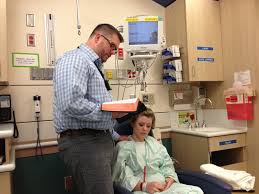
Cell phones are one of most frequent items that family members have with them as they enter the hospital. The advantage is it enables them to keep in contact with those people they want to inform about the patient’s status. This is good because in many situations it can relieve anxiety.
Cell phones also can cause more anxiety. When a patient is in a trauma situation many family members get emotionally worn out answering a high volume of calls and text messages inquiring about the patient status. I had one incident where the family received a phone call from a friend extending sympathy for the patient’s death. The family went over the edge because the hospital had not given the family that information. I was with the family and they demanded an explanation from me about how someone not even in the building could know about the death and yet neither I or anyone else on the staff had told them about it. I was stunned and excused myself for a moment. I checked with the staff and discovered the patient was very much alive and the staff was not expecting that status to change. I asked for permission to tell the family that after I told why I was inquiring. I was told that of course I could relay the information.
When I told the family their patient was very much alive and the prognosis was that the patient was going to remain alive, they were in disbelief. They could not imagine how the caller got the incorrect information about the patient’s status. I was in the consult room when the family returned the call to report the patient was alive and asked the original caller why they thought the patient had died. The answer as that they had driven by the crash site, and observed the crumpled condition of the vehicle and assumed the patient could not have survived the accident.
This post is my plea to anyone who calls a family to inquire about a patient’s status. Please don’t make assumptions about what the status might be. When family is present they are the first individuals to be informed of the patient’s status whether they survive or whether the accident has claimed their life.
To call and report conjecture as fact only inflicts more emotional turmoil on the family than they are already facing. In a lot of cases I feel the family could have a less emotionally stressful time if they turned their cell phones off while waiting for the initial report following a patient arriving at the hospital in a trauma situation. Unfortunately families resist being disconnected from their network of friends and relatives in these situations. So because families want to be connected, please do not make their situation more stressful by presenting opinion as fact, it only compounds the the stress.









